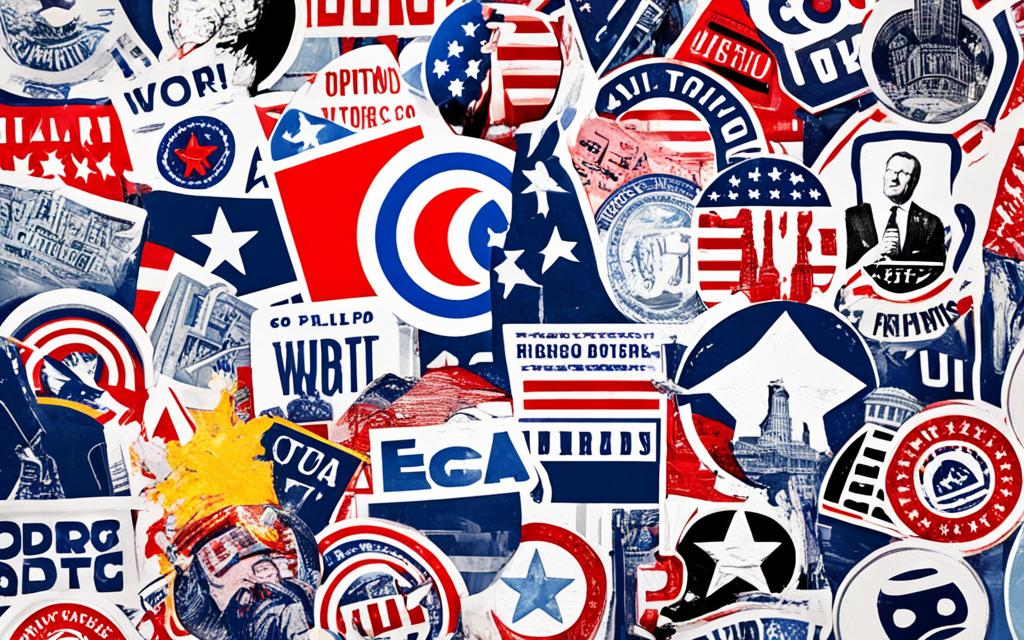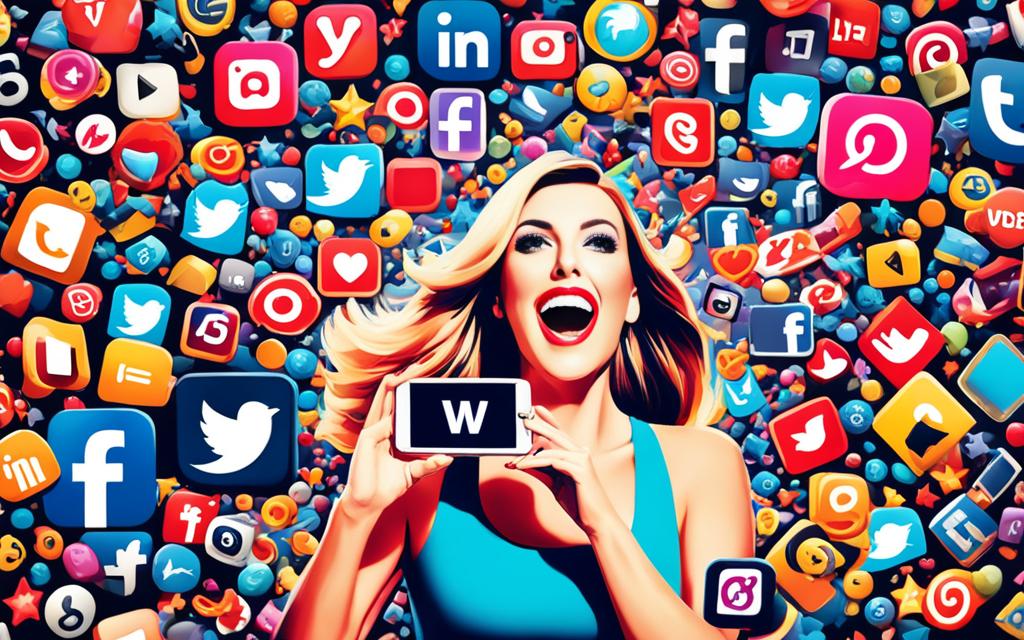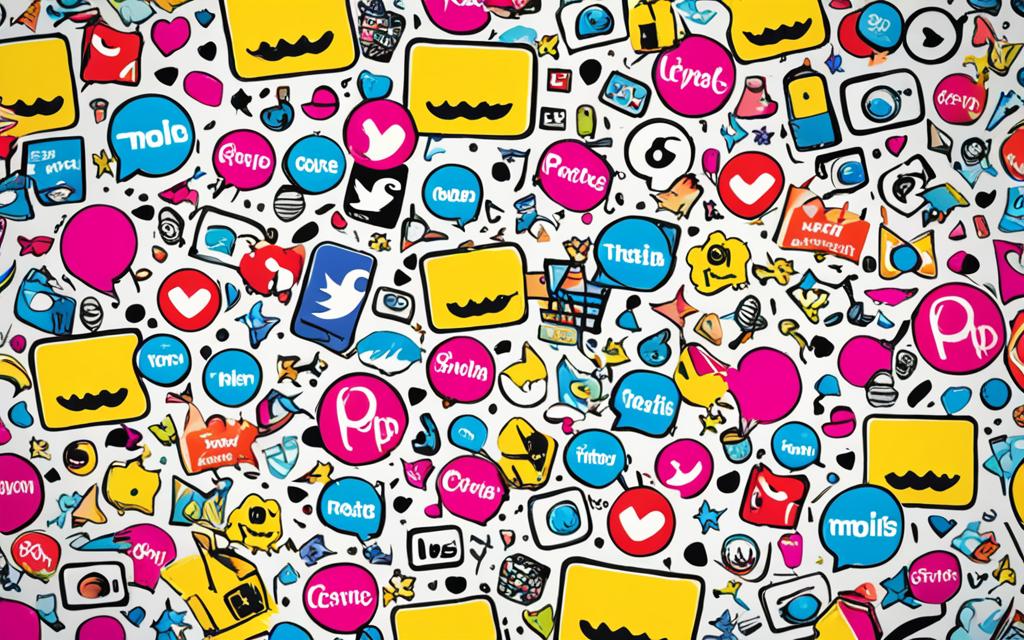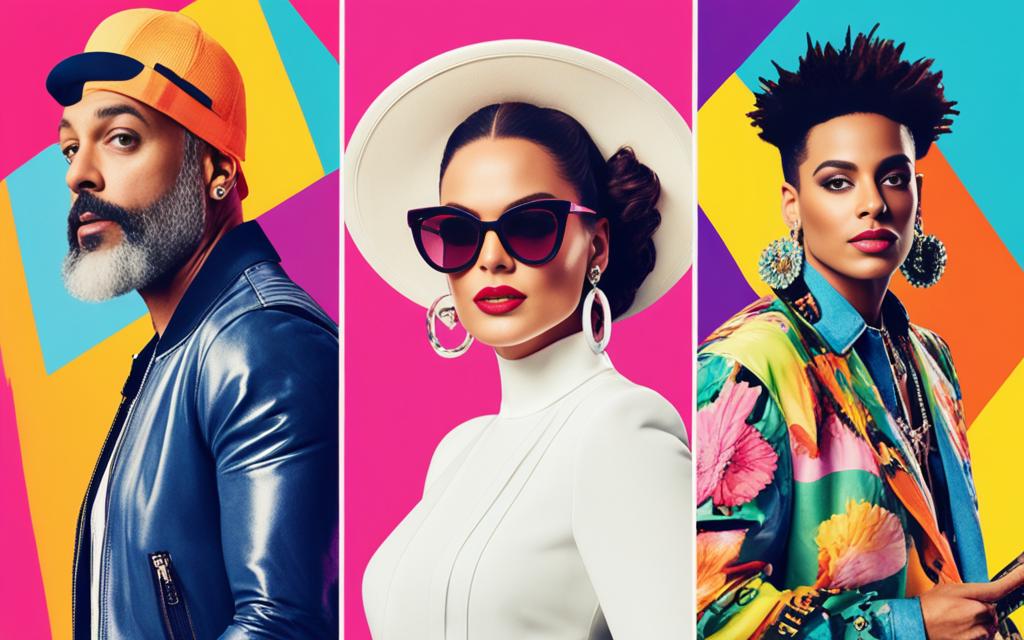Pop culture has an undeniable influence on society and politics, shaping our beliefs, inspiring change, and reflecting the times we live in. From music and movies to fashion and social media, popular culture permeates every aspect of our lives.
Pop culture acts as a mirror, reflecting the values, norms, and aspirations of society. It captures the essence of our collective experiences, giving voice to marginalized voices and shedding light on important social issues. Through popular mediums like music and movies, individuals and communities find solace, inspiration, and a platform to express their thoughts and emotions.
In music, for example, artists often use their lyrics to convey powerful political messages. From Bob Dylan’s iconic protest songs to Kendrick Lamar’s thought-provoking hip-hop verses, musicians have long been agents of change, challenging the status quo and rallying people around important causes.
Movies, too, have the power to shape our political consciousness. Films like “Selma” and “12 Years a Slave” force us to confront the painful realities of racism and injustice, while movies like “The Big Short” shed light on complex financial systems and encourage discussions on economic inequality.
Celebrities, with their massive platforms and fervent fan bases, also wield significant influence in the political realm. Their endorsements and activism can sway public opinion and mobilize millions of people towards a particular cause or movement.
Moreover, pop culture has played a pivotal role in driving social change throughout history. From the civil rights movement of the 1960s, fueled by powerful songs like “We Shall Overcome,” to the #MeToo movement in recent years, sparked by social media conversations and amplified by Hollywood voices, popular culture has proven instrumental in advocating for progress and shifting societal norms.
Media, as a powerful tool for shaping public opinion, further amplifies and disseminates the messages embedded within pop culture. Television, newspapers, and online platforms bring these cultural phenomena to a global audience, influencing perceptions and generating conversations that reverberate through society.
Thus, the impact of pop culture on society and politics cannot be understated. It shapes our collective consciousness, inspires activism, and serves as a reflection of our values and aspirations. By recognizing and analyzing the influence of pop culture, we can gain valuable insights into societal trends and use this knowledge to foster positive change.
Pop Culture as a Reflection of Society
Pop culture, encompassing various forms of media such as movies, music, fashion, and art, serves as an essential mirror to society’s values, beliefs, and concerns. It holds up a lens to the collective consciousness of a given time, reflecting societal trends, ideologies, and aspirations. In fact, pop culture has developed into a dynamic platform that not only entertains but also shapes and influences the way we perceive the world around us.
Through movies and television shows, pop culture highlights the prevailing social issues of the day, capturing the pulse of society. Films like “Black Panther” and “Moonlight” shed light on racial inequality, while documentaries such as “An Inconvenient Truth” bring attention to climate change. Music, too, plays a vital role in reflecting society’s needs, with artists often using their lyrics to express political views, challenge norms, and ignite conversations.
When you see movies, hear songs, or follow social media trends, you are immersing yourself in the interconnected web of values, beliefs, and ideas that make up our society. These cultural artifacts serve as profound reflections of who we are as a people and the issues we face together.
Moreover, celebrities, often considered the embodiment of popular culture, utilize their platforms to advocate for causes close to their hearts, driving social change in the process. Whether through charity work, public endorsements, or outspoken activism, these influential figures mobilize their vast followings and amplify important messages. Their involvement sparks conversations and encourages civic engagement, inspiring individuals to take action and participate in political movements.
In addition to addressing social and political concerns, pop culture also offers an escape from reality, providing entertainment that can unite individuals from diverse backgrounds. It serves as a unifying force that transcends borders, language, and cultural differences. From blockbuster movies with diverse casts to chart-topping songs that resonate with people worldwide, pop culture has the power to bridge divides and foster a sense of shared experiences and understanding.
Throughout history, popular media has played an integral role in shaping public opinion and influencing societal change. By examining the themes, narratives, and characters depicted in movies, music, and other expressions of pop culture, we can gain valuable insights into the collective consciousness of our time and understand the current social and political climate more deeply.
The Role of Pop Culture in Shaping Public Opinion
Pop culture not only reflects but also actively shapes public opinion. By representing diverse characters, challenging social norms, and promoting inclusive narratives, popular media influences how we perceive and interact with various social issues. For example, television shows such as “Pose” and “Orange is the New Black” have contributed to the increased visibility and acceptance of LGBTQ+ communities in society.
Furthermore, through its storytelling power, pop culture has the ability to humanize complex political topics, making them more accessible and relatable to the general public. By engaging audiences emotionally, movies and music can foster empathy and understanding, facilitating conversations about pressing issues and prompting meaningful change.
In conclusion, pop culture stands as a powerful mirror that reflects the values, concerns, and aspirations of society. It serves as a medium that not only entertains but also educates, challenges, and inspires. By examining the themes and messages embedded within popular media, we can gain profound insights into the collective psyche of a generation and use these reflections to drive positive social and political transformation.
Political Messages in Music and Movies
Music and movies have long been influential forms of popular culture, capable of capturing the attention and hearts of millions. Beyond entertainment value, these mediums have often served as powerful platforms for political messages and social commentary. Artists and filmmakers have utilized the universal language of music and the visual impact of movies to convey important political ideas, champion causes, and inspire social change.
Throughout history, political messages in music and movies have played a significant role in shaping public opinion and mobilizing movements. Musicians and bands like Bob Dylan, John Lennon, and Public Enemy have used their lyrics to challenge authority, raise awareness about social issues, and rally the masses in pursuit of change. Their songs became anthems for social justice, addressing themes such as civil rights, war, and inequality. By tapping into the emotions of their audiences, these artists created connections, sparking conversations and inspiring action.
Similarly, filmmakers have employed political messages in movies to shed light on societal injustices, expose political corruption, and provoke critical thinking. Movies like “Inconvenient Truth” and “Selma” have sparked discussions about climate change and racial inequality, respectively. Through storytelling and visual imagery, these movies allowed audiences to empathize with the struggles faced by marginalized groups and encouraged them to take action.
The use of political messages in music and movies has the power to transcend barriers and reach people on a deeply emotional level. They leverage the influence of popular culture to foster conversations, challenge the status quo, and motivate individuals to participate actively in political discourse. By intertwining political messages with entertainment, artists and filmmakers make important issues more accessible, engaging a broader audience beyond traditional political platforms.
In some cases, political messages in music and movies have even influenced public opinion and shaped political movements. Iconic songs like “Blowin’ in the Wind” by Bob Dylan became anthems for the anti-war movement during the Vietnam War. By incorporating political themes into their artistic expressions, musicians and filmmakers provide a voice for the marginalized and encourage collective action.
The importance of political messages in music and movies cannot be underestimated. They offer a unique opportunity to engage individuals, spark dialogue, and inspire social change. These mediums have the power to challenge prejudice, humanize complex issues, and unite people around common values. Through their creative endeavors, musicians and filmmakers continue to make an indelible impact on society, amplifying political movements, and shaping the course of history.
Influence of Celebrities on Political Movements
Celebrities have long played a significant role in influencing political movements and causes. With their massive following and influential status, these figures have the power to shape public opinion and mobilize people towards social and political change. Their charisma, star power, and ability to connect with their fans make them powerful advocates for important issues.
When celebrities align themselves with specific political movements, they bring attention to the cause and amplify its message. Their involvement generates media coverage, which further spreads awareness among the general public. Celebrities have the platform to reach millions of people through social media, interviews, and public appearances, making them valuable allies for political campaigns and social justice movements.
Take, for example, climate change activism. When renowned actor Leonardo DiCaprio became an outspoken advocate for environmental conservation, his influence helped bring attention to the urgent need for action. He founded the Leonardo DiCaprio Foundation, which supports environmental initiatives globally, and produced the critically acclaimed documentary “Before the Flood,” which shed light on the devastating effects of climate change.
Another powerful example is the impact of singer-songwriter Taylor Swift on voter registration in the United States. In 2018, Swift broke her long-standing political silence and encouraged her fans to vote in the midterm elections. This endorsement sparked widespread discussion and motivated thousands of young people to register to vote, showcasing the significant influence celebrities can have on political engagement.
“Celebrities have the unique ability to bridge the gap between pop culture and political activism,” says political analyst Rachel Smith. “Their involvement not only raises awareness but also helps shape the narrative surrounding key issues. It’s a symbiotic relationship where celebrities lend their fame and platform to important causes, while the causes themselves gain increased visibility and support.”
In addition to raising awareness, celebrities have the power to sway public opinion. People often view celebrities as relatable and trustworthy figures, so when they express their political beliefs, it can influence their fans and followers. This influence can be particularly impactful during elections and referendums, where celebrities’ endorsements can sway undecided voters. Politicians and political organizations recognize this and frequently seek celebrity endorsements to gain favor from the public.
Celebrity Advocacy and Activism: A Closer Look
To illustrate the influence of celebrities on political movements, let’s take a closer look at a table showcasing some notable instances of celebrity advocacy and their impact:
| Celebrity | Political Movement/Cause | Impact |
|---|---|---|
| Emma Watson | HeForShe campaign | Increased awareness of gender equality issues and inspired men to become allies in the fight for women’s rights. |
| Colin Kaepernick | Black Lives Matter movement | Started a national conversation on police brutality and racial inequality, leading to widespread protests and demands for justice. |
| Angelina Jolie | Refugee crisis | Brought attention to the plight of refugees and advocated for compassionate immigration policies, influencing public opinion and inspiring action. |
These examples demonstrate the palpable influence that celebrities can have on various political movements and causes. Through their activism, endorsements, and personal engagement, they play a vital role in shaping public discourse and mobilizing society towards positive change.
Pop Culture and Social Change
Pop culture has long been recognized as a powerful force that not only entertains but also influences society. Through music, movies, television shows, and other forms of popular media, pop culture has the ability to shape public opinion and drive social change. In this section, we will explore the intricate relationship between pop culture and social change, examining how cultural icons and media have inspired collective action and impacted legislation and societal norms.
From the Civil Rights movement in the 1960s to the recent protests for racial justice, pop culture has played a significant role in amplifying voices and raising awareness about important social issues. Through their artistry and platforms, musicians and actors have sparked conversations, galvanized movements, and challenged the status quo.
“Artists have the power to influence society through their creativity and reach. They can shape public perception and challenge deeply ingrained beliefs.”
For example, the iconic song “We Shall Overcome” became an anthem for the Civil Rights movement, with its lyrics inspiring hope and unity among activists. Similarly, movies like “Selma” and “12 Years a Slave” shed light on the struggles faced by African Americans, igniting conversations about racial inequality and the need for change.
More recently, the #MeToo movement, which originated in Hollywood, exposed the prevalence of sexual harassment and assault in various industries. The movement gained momentum as celebrities shared their stories and expressed solidarity, leading to a wave of activism and policy changes.
Moreover, pop culture has played a crucial role in promoting inclusivity and acceptance of marginalized communities. Television shows like “Pose” and “Orange Is the New Black” have provided a platform for LGBTQ+ representation, fostering empathy and understanding among viewers.
In conclusion, pop culture holds immense potential for driving social change. It has the ability to raise awareness, challenge societal norms, and inspire collective action. As we continue to consume and engage with popular media, it is important to recognize the transformative power of pop culture and how it can shape our perceptions, values, and ultimately, the world we live in.
The Role of Media in Shaping Public Opinion
The media plays a significant role in shaping public opinion, influencing the way we think and perceive the world around us. Through news outlets, social media platforms, and other channels of communication, media has the power to disseminate information and shape narratives that impact our beliefs and decision-making processes.
News outlets are instrumental in delivering news and analysis, providing us with the latest information on political events, social issues, and cultural developments. They serve as a primary source of news for many individuals, shaping their understanding of current affairs and influencing their opinions.
Social media platforms have also emerged as crucial players in shaping public opinion. With their widespread reach and accessibility, platforms like Facebook, Twitter, and Instagram have become powerful tools for spreading information, promoting ideas, and mobilizing movements. They provide individuals with a platform to share their thoughts, engage in discussions, and manipulate public sentiment.
From viral videos to trending hashtags, social media has the ability to amplify certain messages and influence public discourse on a massive scale.
The media’s influence on public opinion extends beyond news and social media. Popular culture, such as movies, music, and television shows, can also shape our perceptions and beliefs. These forms of media often reflect and reinforce societal norms and values, presenting certain ideologies and narratives as desirable or acceptable.
For example, political messages embedded in songs or movies can sway public sentiment towards a particular cause or belief. Artists and filmmakers often use their platforms to express their views and inspire social change. These cultural artifacts have the potential to reach a wide audience and provoke thought and discussion on important issues.
It is essential to recognize the power and influence wielded by the media in shaping public opinion. As consumers of media, it is crucial to be discerning and critical of the information we encounter, considering the possible biases and agendas behind the messages we receive.
By actively seeking diverse perspectives, questioning narratives, and fact-checking information, we can navigate the media landscape more effectively and form opinions that are well-informed and independent. It is through this critical engagement with the media that we can make choices that align with our own values and contribute to a more informed and democratic society.
Conclusion
In conclusion, the influence of pop culture on society and politics cannot be underestimated. Throughout this article, we have explored how pop culture serves as a reflection of society, showcasing the issues and values that are important to us. From the political messages embedded in music and movies to the influence of celebrities on political movements, pop culture has the power to shape our identities and drive social change.
Furthermore, the role of media in shaping public opinion cannot be overlooked. The constant exposure to pop culture through various media channels has a profound impact on how we perceive political issues and events. It shapes our beliefs, attitudes, and ultimately our decisions.
Looking towards the future, the impact of pop culture is only expected to grow. With the advancements in technology and the increasing interconnectedness of our global community, pop culture will continue to play a significant role in shaping society and politics. It will serve as a medium for expressing dissent, promoting inclusivity, and driving positive change in our world.








